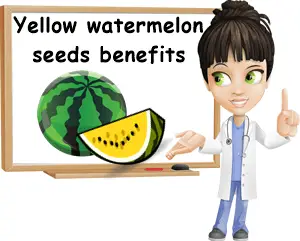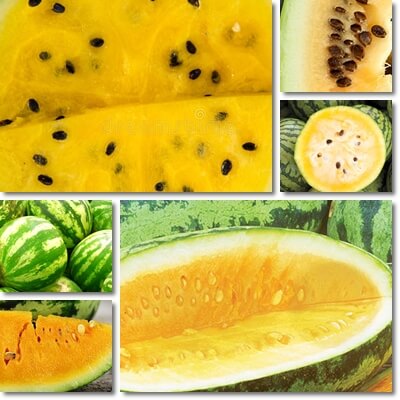Can you eat yellow watermelon seeds? How safe is it to eat yellow watermelon seeds? And what exactly happens if you eat yellow watermelon seeds? Anyone who’s ever accidentally swallowed a watermelon seed has wondered just how safe it is to eat watermelon seeds in general, whether they are even edible and, if so, what amount is safe to eat without risking side effects.
What do yellow watermelon seeds look like?
Yellow watermelon seeds look like all other watermelon seeds: flattened and egg-shaped, that is, rounded at one end and pointy at the other. The immature seeds are white to cream-colored, almost see-through, soft and chewy, with a somewhat bland, milky taste. They are essentially a flexible chewy shell with no discernible kernel. As they start to mature, the color transitions to a solid white and the seed differentiates into a shell and a kernel. Mature yellow watermelon seeds have a hard, brown to black shell that contains a milky white, slightly nutty kernel.

Can you eat yellow watermelon seeds?
Yellow watermelon seeds are perfectly edible. You can eat yellow watermelon seeds raw, dried or roasted, whole or just the kernels. The immature seeds are often eaten together with the watermelon flesh. The mature seeds are typically removed, dried or roasted and shelled prior to consumption, and you only eat the kernels, not the hard outer shell. It’s only accidentally that people eat whole watermelon seeds, shell and kernel.
What do yellow watermelon seeds taste like?
The immature, almost see-through seeds taste relatively bland, with light milky flavors and a gummy consistency. The raw kernels from the mature seeds don’t have too much of a taste either, just faint nutty flavors and a slightly crunchy, milky texture. The shells themselves are quite flavorless. Roasted yellow watermelon kernels taste slightly nuttier than raw ones. Pan or oven roasted whole yellow watermelon seeds have light smoky flavors, whereas salted and oil-roasted seeds taste salty and oily.
What happens if you eat yellow watermelon seeds?
Immature yellow watermelon seeds are meatless and so thin and flavorless they are often eaten together with the watermelon flesh. Because of their consistency, soft and gummy-like, they are simply digested so nothing really happens if you eat them. As for the mature seeds with a hard outer casing, people don’t normally eat them whole. When they do eat them whole, it’s accidentally (watermelon seeds are quite slippery) and only a few seeds actually get eaten. What happens if you eat yellow watermelon seeds whole, shell and kernels, is they come out as they came in. If you chew them before swallowing, they come out in pieces.

How safe is it to eat yellow watermelon seeds?
A healthy person should not experience any side effects from eating yellow or other watermelon color seeds. Even if you accidentally swallow a few seeds whole while eating yellow watermelon, you should be okay and the seeds should come out as they came in, or in pieces. Ideally, you should not be eating significant amounts of mature yellow watermelon seeds whole because the brown-black shell is essentially indigestible.
Eating too many seeds is bad for you and can cause digestive upset, including a stomach ache and cramps.
In the case of someone with diverticulitis, that is, inflammation of the pouches occurring naturally along the intestinal tract, or as a result of herniation, too many seeds may stagnate and get blocked together with stool matter. This can result in constipation, abdominal pain, painful cramps and, in rare cases, intestinal blockages. Eating just the kernels however is good for you because the kernels are perfectly digestible, as well as an important source of nutrition.
Also see the benefits of yellow watermelon.
Nutritional information yellow watermelon seeds
Nutrition facts of yellow watermelon seed kernels per oz (28.35 grams):
- High-protein: 8 g of protein/oz
- High-fat: 13.4 g of fat (2.77 g saturated fats, 2.1 g monounsaturated fats, 8 g polyunsaturated fats)
- Low-carb: 4.34 g of total carbohydrates
- Source of essential and non-essential amino acids
- High-calorie: 158 kilocalories/oz
- Source of calcium (15.3 mg), copper (0.194 mg), iron (2 mg), magnesium (146 mg), manganese (0.458 mg), phosphorus (214 mg), potassium (184 mg), sodium (28.1 mg), zinc (2.9 mg)
- Source of vitamin B1 (0.054 mg), vitamin B2 (0.041 mg), vitamin B3 (1.01 mg), vitamin B5 (0.098 mg), vitamin B6 (0.025 mg), vitamin B9 (16.4 mg), vitamin E
- No vitamin A
- No vitamin C
- No vitamin B12
- No vitamin D
- No vitamin K
What are the benefits yellow watermelon seeds ?
The benefits of yellow watermelon seeds are actually the benefits of yellow watermelon kernels. The brown-black shell is essentially inedible and only the kernels provide nutrition and benefits for health.
- Excellent nutritional value: high protein, high fat food, rich in vitamins and minerals.
- Good food for muscles: supports normal muscle function and muscle growth.
- Energizing properties: high in vitamins and minerals, yellow watermelon seed kernels boost energy levels and combat fatigue.
- Benefits for high blood pressure: yellow watermelon seed kernels are high in potassium and magnesium and help lower blood pressure numbers.
- Benefits for blood circulation: source of vitamin B3 and iron which support good blood circulation.
- Benefits for the skin thanks to a varied content of B vitamins and unsaturated fatty acids which support skin health.
- Benefits for the nervous system thanks to B group vitamins and amino acids content.
- Benefits for the immune system thanks to a good zinc content.
- Good food for diabetics: yellow watermelon seed kernels have a low glycemic index score and don’t raise blood sugar levels excessively.
- Antioxidant properties owed to unsaturated fatty acids, copper, manganese, zinc and antioxidant polyphenols which help combat free radical damage to cells and DNA.
- Benefits for pregnant women: yellow watermelon seed kernels are high in potassium and magnesium for lower blood pressure numbers; the kernels are a source of iron and B vitamins to support the circulatory system during pregnancy and a source of folic acid (vitamin B9) for the normal development of the baby in the womb.
